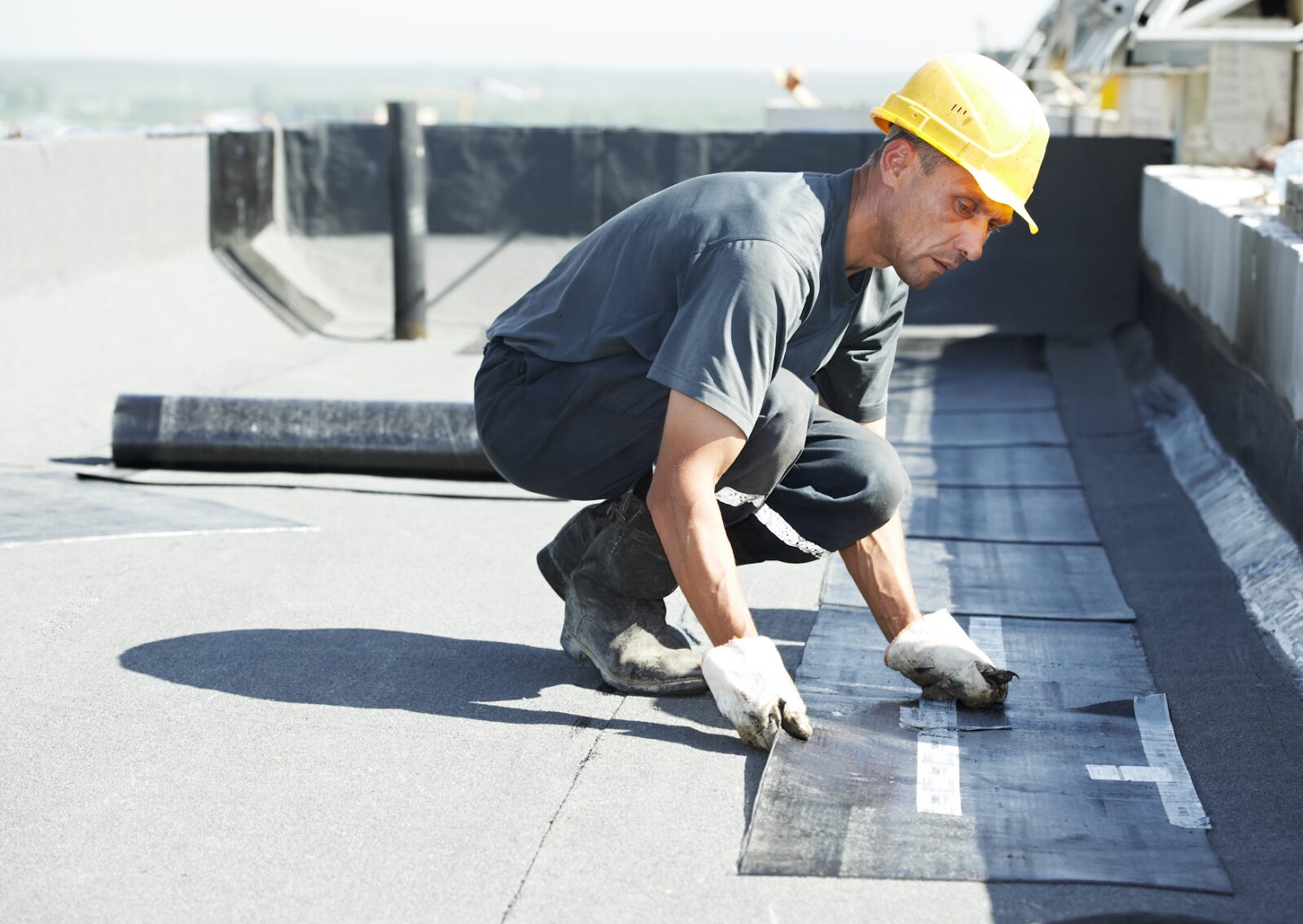When it comes to protecting your building, the roof is one of the most important investments you’ll ever make. At M&E Painting and Roofing, we’ve seen firsthand what happens when businesses cut corners by hiring the wrong contractor: delays, cost overruns, and even premature roof failure. We believe every business owner deserves access to high-quality roofing services backed by proven expertise and local accountability. That’s why we’ve created this guide, to help you know exactly what to look for in a reliable commercial roofing contractor.
What Defines a Trustworthy Commercial Roofing Contractor?

Choosing the right commercial roofing contractor is a decision that can directly impact your building’s lifespan, the safety of your employees, and your long-term business costs. A reliable roofing contractor should be licensed, insured, and have a track record of successful commercial roofing projects. More than just someone who installs roofing materials, they should understand the scope of industrial and commercial roofing jobs, from planning to final inspection.
The best commercial roofing company will provide a clear contract, a detailed estimate, a reasonable project timeline, and a team of skilled employees. They won’t just say they do quality work, they’ll show you past projects and customer testimonials that prove it.
Why Is Experience in Commercial Roofing Crucial for Your Building?

Experience matters, especially when it comes to commercial roofing. It’s not the same as a residential project. There are larger surface areas, more complex roofing systems, and higher safety requirements. A skilled commercial roofer knows how to manage installation around sensitive equipment or busy operations. They also know what permits and codes apply to industrial buildings and commercial spaces.
If you’re hiring a roofing contractor without commercial experience, you could be exposing your building to delays, costly repairs, or even full replacement sooner than expected. According to a report by FacilitiesNet, lack of experience is one of the top reasons commercial roofs fail early (FacilitiesNet).
What Makes Industrial Roofing Different from Standard Roofing Jobs?

Industrial roofing is built for performance under stress. Think heavy materials, chemical exposure, and constant vibration from machinery. While residential roofing often focuses on aesthetics, industrial roofing needs to withstand tough environments. That’s why the roofing materials and designs are so different.
A professional commercial roofing contractor understands the need for thermal resistance, proper drainage, and insulation in industrial settings. They’ll recommend roofing systems like TPO, EPDM, or metal that offer better longevity and are easier to maintain over time.
How Can You Evaluate a Roofing Company’s Reputation and Track Record?

Your first step is to research the roofing company online. Look at Google reviews, their Better Business Bureau profile, and independent rating sites. But don’t stop there, ask for references. Ask how long they’ve been in the commercial roofing industry and request examples of similar completed projects.
A company’s size can sometimes signal their capability to handle large installation projects, but that doesn’t always equal quality. What matters most is their reputation with building owners, the clarity of their communication, and the service life of their previous installations.
Should a Commercial Roofing Contractor Be Listed with the Better Business Bureau?

Yes. Accreditation with the Better Business Bureau signals credibility. It shows the company is transparent with its customers and is committed to resolving complaints fairly. A trustworthy commercial roofing contractor should have at least a “B” rating and preferably be accredited.
M&E Painting and Roofing, for example, maintains high customer ratings and is known in Northern Colorado for their integrity and professional approach. That kind of reputation makes a difference when you’re investing thousands in a roofing job.
What Roofing Systems Should a Reliable Contractor Be Familiar With?

There’s no one-size-fits-all solution in commercial roofing. Reliable contractors must be skilled in a wide range of roofing systems, including:
- TPO (Thermoplastic Polyolefin)
- EPDM (Ethylene Propylene Diene Terpolymer)
- Modified Bitumen
- PVC
- Standing Seam Metal Roofs
These materials serve different needs, from energy efficiency to resistance to industrial fumes. Contractors must know which systems work best for specific industrial or commercial settings and ensure installation meets manufacturer standards.
What Questions Should You Ask About New Roofing Installation Projects?

Before signing a contract, ask the right questions:
- What is the timeline for the installation project?
- What type of roofing materials will be used?
- Are there any known safety risks to address on-site?
- Will the team work around business hours?
- Do they offer a limited warranty?
You deserve straight answers. Clear communication avoids hidden fees, misaligned expectations, and scheduling conflicts that could affect your business.
Why Should You Choose a Local Company Over a National Franchise?

A local company understands your area’s weather patterns, building codes, and common roofing issues. Unlike large national contractors, a local company can respond quickly to emergencies or repairs and maintain consistent communication throughout the process.
M&E Painting and Roofing is a trusted name in Northern Colorado because of its dedication to personalized service, local knowledge, and reliable timelines. Choosing a commercial roofing company like M&E ensures you’re working with a team that values your business, understands your region, and is committed to delivering high-quality results with a personal touch.
How Do Commercial Roofing Contractors Handle Repairs and Replacements?

Reliable contractors start with a full inspection. They’ll look for leaks, membrane issues, flashing damage, or poor drainage. Then, they recommend repair or replacement based on the roof’s condition and the building’s future use.
A good commercial roofer will explain the costs, timing, and materials for each option. If you’re unsure, ask for documentation, photos, drone footage, or moisture scans, to understand the need for work.
What Role Does Safety Play in Commercial Roofing Jobs?

Safety is non-negotiable. Reputable contractors follow OSHA guidelines, maintain insurance, and train their employees in fall protection and equipment usage. If your roofing company doesn’t take safety seriously, you’re putting your property and people at risk.
You should also confirm they use quality tools and adhere to safety signage, harness systems, and post-project cleanup. Roofing services that cut corners on safety are often the same ones that cut corners on quality work.
Are You Getting a Fair Estimate for Your Roofing Materials and Services?

Comparing estimates helps you see which contractor offers the best value. Watch for vague quotes or bids that seem too low. A proper estimate should include:
- Labor costs
- Materials and delivery fees
- Tools and equipment use
- Timeline and cleanup
Remember, cheaper isn’t better. A fair quote from a reputable roofing contractor often results in longer service life and fewer future repairs.
What Guarantees and Limited Warranties Should a Contractor Offer?

Your roofing job should come with written guarantees. These fall into two categories:
- Manufacturer warranties on roofing materials
- Workmanship warranties from the contractor
The best commercial roofing companies stand behind both. If the installation fails or leaks appear within a set period, they’ll fix it at no extra cost. Read the fine print and clarify exclusions before you sign.
How Can You Tell If a Roofing Contractor Has the Right Expertise for Your Industry?

Different industries have different needs. A hospital roof requires different sealing and ventilation than a food processing facility. Ask if the contractor has completed similar projects. Review case studies and ask how they solved problems on-site.
Their expertise should cover industrial roofing, water mitigation, insulation requirements, and code compliance. If they can’t speak to these, they’re probably not a good fit for your business.
When Should You Schedule Your Commercial Roofing Project?

Spring and fall offer the best weather for most roofing materials to set properly. Winter projects may face weather delays, and summer installation can be tricky due to heat stress on workers and materials.
Plan ahead. Schedule your commercial roofing work when it least disrupts your operations, typically during holiday closures, slow seasons, or off-peak hours.
Ready to Hire a Commercial Roofing Expert?

Don’t gamble with your building or your bottom line. Choose a contractor who understands commercial roofing, values safety, and delivers long-term results. Look for professionalism, prompt communication, and transparency.
At this point, your next step should be clear: contact a licensed and proven commercial roofing contractor in your area, get a thorough estimate, and ask for references. Compare your options, but don’t compromise on quality work or safety.
M&E Painting and Roofing continues to be a go-to choice for Colorado businesses looking for honest pricing, dependable roofing services, and responsive communication. When it comes to protecting one of your biggest business assets, your roof, you deserve a team you can trust.
Final Thoughts
We know how much is riding on your choice of a commercial roofing contractor. Your roof isn’t just part of your building, it’s protection for your employees, customers, and assets. Whether you’re looking at a full installation project, minor repairs, or a complete replacement, we encourage you to work with someone who combines skill with reliability. Your building deserves no less.
Works Cited
FacilitiesNet. “5 Reasons Commercial Roofs Fail and How to Prevent Them.” FacilitiesNet, Trade Press Media Group, 4 Oct. 2018, https://www.facilitiesnet.com/roofing/article/5-Reasons-Commercial-Roofs-Fail-and-How-to-Prevent-Them–18162.
National Roofing Contractors Association. “How to Select a Roofing Contractor.” NRCA, https://www.nrca.net/consumer/how-to-select-a-roofing-contractor. Accessed 26 May 2025.Building Owners and Managers Association International. “Roofing Systems: What Every Facilities Manager Should Know.” BOMA International,
Frequently Asked Questions
1. What makes a commercial roofing contractor reliable?
A reliable commercial roofing contractor is licensed, insured, and has proven experience with large-scale projects. They provide clear estimates, strong warranties, and a portfolio of successful jobs backed by customer testimonials.
2. How is commercial roofing different from residential roofing?
Commercial roofing typically involves larger surfaces, specialized materials, and more complex systems compared to residential roofs. It also requires greater knowledge of safety regulations, drainage solutions, and insulation performance.
3. Why should I choose a local commercial roofing company?
Local companies like M&E Painting and Roofing understand regional weather, codes, and client needs. They also offer faster response times and personalized service that large national brands often can't match.
4. What are the most common types of roofing systems used in commercial projects?
Popular systems include TPO, EPDM, modified bitumen, PVC, and metal roofs. The right system depends on your building's use, climate, and budget.
5. How can I check a roofing company's reputation?
Look at their Better Business Bureau rating, online reviews, and ask for references. A contractor's transparency and willingness to show past work are strong indicators of credibility.
6. What questions should I ask before signing a roofing contract?
Ask about the installation timeline, safety procedures, roofing materials, limited warranties, and how they plan to minimize disruption to your business.
7. What safety measures should a commercial roofing contractor follow?
They should comply with OSHA standards, use appropriate tools and harnesses, and train employees in fall protection. A contractor that values safety typically delivers higher-quality results.
8. How do commercial roof repairs and replacements work?
Repairs start with a thorough inspection. Based on the roof’s condition, the contractor may suggest repairs or a full replacement, including cost and timeline breakdowns.
9. What should be included in a commercial roofing estimate?
A detailed estimate includes labor, materials, tools, project duration, and cleanup. Be wary of vague or unusually low quotes that may lead to hidden costs.
10. What kind of warranties should I expect from a commercial roofing contractor?
Expect both a manufacturer’s warranty on materials and a workmanship warranty from the contractor. These provide peace of mind and protect your long-term investment.
